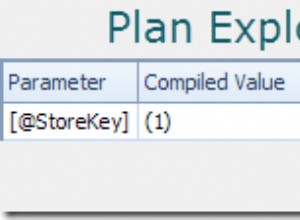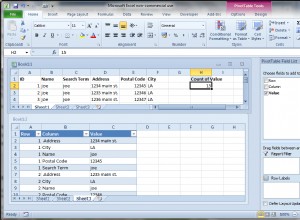Qualcosa del genere (si prega di notare che questo non è testato al 100% e potrebbe aver bisogno di qualche ritocco per funzionare davvero :))
//define array may (probably better ways of doing this
$stocks = array(
1 => 22,
2 => 23,
3 => 24,
4 => 25,
5 => 26,
6 => 27,
7 => 28,
8 => 29,
9 => 30,
10 => 31
);
$handle = fopen("file.csv", "r")); //open file
while (($data = fgetcsv($handle, 1000, ";")) !== FALSE) {
//loop through csv
$updatesql = "UPDATE t SET `value` = ".$data[2]." WHERE fielddef_id = ".$stocks[$data[0]]." AND product_id = ".$data[1];
echo "$updatesql<br>";//for debug only comment out on live
}
Non è necessario eseguire la selezione iniziale poiché imposti i dati del tuo prodotto solo su 1 comunque nel tuo codice e sembra dalla tua descrizione che gli ID del tuo prodotto siano sempre corretti, è solo la colonna fielddef che ha la mappa.
Inoltre, solo per il live, non dimenticare di inserire il tuo attuale comando mysqli execute nel tuo $updatesql;
Per darti un confronto con il codice di utilizzo effettivo (posso confrontare!) Questo è un codice che uso per un importatore di un file caricato (non è perfetto ma fa il suo lavoro)
if (isset($_POST['action']) && $_POST['action']=="beginimport") {
echo "<h4>Starting Import</h4><br />";
// Ignore user abort and expand time limit
//ignore_user_abort(true);
set_time_limit(60);
if (($handle = fopen($_FILES['clientimport']['tmp_name'], "r")) !== FALSE) {
$row = 0;
//defaults
$sitetype = 3;
$sitestatus = 1;
$startdate = "2013-01-01 00:00:00";
$enddate = "2013-12-31 23:59:59";
$createdby = 1;
//loop and insert
while (($data = fgetcsv($handle, 10000, ",")) !== FALSE) { // loop through each line of CSV. Returns array of that line each time so we can hard reference it if we want.
if ($row>0) {
if (strlen($data[1])>0) {
$clientshortcode = mysqli_real_escape_string($db->mysqli,trim(stripslashes($data[0])));
$sitename = mysqli_real_escape_string($db->mysqli,trim(stripslashes($data[0]))." ".trim(stripslashes($data[1])));
$address = mysqli_real_escape_string($db->mysqli,trim(stripslashes($data[1])).",".trim(stripslashes($data[2])).",".trim(stripslashes($data[3])));
$postcode = mysqli_real_escape_string($db->mysqli,trim(stripslashes($data[4])));
//look up client ID
$client = $db->queryUniqueObject("SELECT ID FROM tblclients WHERE ShortCode='$clientshortcode'",ENABLE_DEBUG);
if ($client->ID>0 && is_numeric($client->ID)) {
//got client ID so now check if site already exists we can trust the site name here since we only care about double matching against already imported sites.
$sitecount = $db->countOf("tblsites","SiteName='$sitename'");
if ($sitecount>0) {
//site exists
echo "<strong style=\"color:orange;\">SITE $sitename ALREADY EXISTS SKIPPING</strong><br />";
} else {
//site doesn't exist so do import
$db->execute("INSERT INTO tblsites (SiteName,SiteAddress,SitePostcode,SiteType,SiteStatus,CreatedBy,StartDate,EndDate,CompanyID) VALUES
('$sitename','$address','$postcode',$sitetype,$sitestatus,$createdby,'$startdate','$enddate',".$client->ID.")",ENABLE_DEBUG);
echo "IMPORTED - ".$data[0]." - ".$data[1]."<br />";
}
} else {
echo "<strong style=\"color:red;\">CLIENT $clientshortcode NOT FOUND PLEASE ENTER AND RE-IMPORT</strong><br />";
}
fcflush();
set_time_limit(60); // reset timer on loop
}
} else {
$row++;
}
}
echo "<br />COMPLETED<br />";
}
fclose($handle);
unlink($_FILES['clientimport']['tmp_name']);
echo "All Imports finished do not reload this page";
}
Ciò ha importato 150.000 righe in circa 10 secondi




